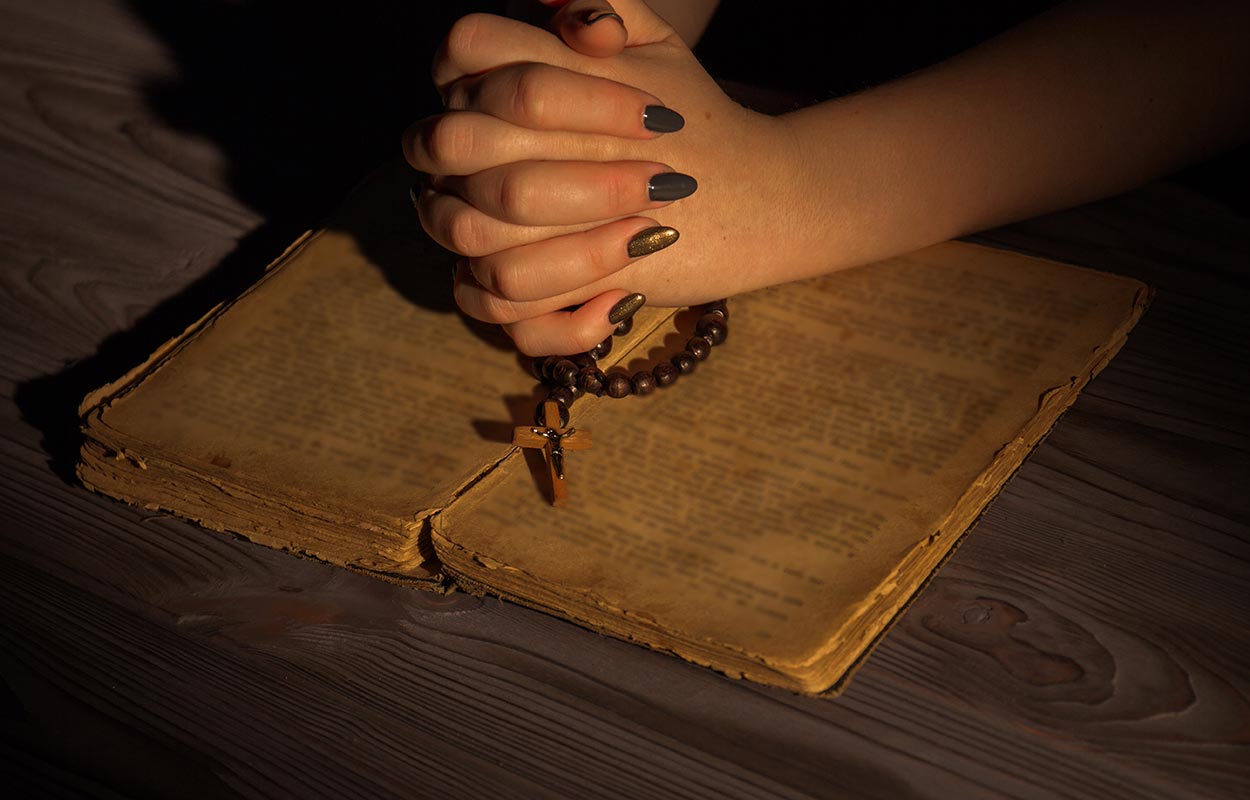Understanding Religious OCD Symptoms & Treatment

Obsessive compulsive disorder (OCD) can take on many different forms and include many types of obsessions. One of these comes in the form of religious OCD.
OCD is a disorder that causes unwanted thoughts and fears (obsessions) and repetitive behaviors (compulsions) that interfere with daily life. [1] According to the National Institute of Mental Health, approximately 1-3% of adults are affected by OCD to the point of marked distress and functional impairment. [2]
Religious OCD is a subtype of OCD characterized by obsessions and compulsions related to religion or morality. Understanding religious OCD symptoms and getting the proper diagnosis are important when it comes to finding treatment.
True Life Care Mental Health Treatment of New Jersey provides treatment for people dealing with all types of OCD so that they can live a happier life. We provide the tools that are necessary to release the hold that OCD behavior can have on a person.
Key Points
- Scrupulosity, also known as religious OCD, is a type of OCD involving obsessions and compulsions centered around religion and morality.
- While the exact cause of scrupulosity is unknown, both genetic and environmental factors may contribute to the disorder.
- Religious OCD is not linked to one particular religion.
- Symptoms of scrupulosity include fear of committing sins, seeking reassurance about beliefs, and compulsive behaviors.
- Diagnosing scrupulosity involves assessing a patient’s symptoms, including intrusive thoughts about their faith.
- Treating scrupulosity can include various mental and behavioral health therapies as well as medication.
What is Scrupulosity?
Scrupulosity, or religious OCD, is a type of OCD where a person has obsessions or compulsions that center around religion or morality. [3] It is estimated that up to one-third of all people who experience OCD in their lifetime will have some symptoms of scrupulosity. [4] Its obsessions and compulsions, such as constant praying, can interfere significantly with daily life and responsibilities, such as going to work.
It’s important to note that people don’t need to practice religion to experience religious OCD. Many people who suffer from scrupulosity don’t associate with a particular religion.
Is Scrupulosity Part of OCD?
Scrupulosity is a form of OCD that focuses on religion and causes people to fixate on that singular theme. Their OCD centers around many different religious ideas and morals. Scrupulosity can take up a significant amount of time in a person’s life because of the constant obsessions.
What Causes Scrupulosity?
The exact cause of scrupulosity is unknown. It is thought to be triggered by a combination of genetic and environmental factors. [5] While scrupulosity is not specifically linked to one specific religion, it is more common in people who are involved in a religious practice and who also have OCD. [6]

Scrupulosity Symptoms
There are several symptoms that people may exhibit that signal they are dealing with religious scrupulosity.
Many people have obsessions that focus on fear of angering the god they believe in. These include: [7]
- Fear of committing a sin
- Fear of death
- Fear that they will go to hell or be punished by God
- Always striving to be pure
- Afraid of being possessed
- Doubting what you truly believe
- Feeling compelled to confess every sin
Besides having obsessive thoughts, people with religious OCD may also have compulsive behaviors. Over time, these behaviors become more time-consuming and can interfere with daily responsibilities like going to work.
Examples of these behaviors are: [8]
- Excessively confessing perceived sins
- Writing prayers to make sure they’re done right
- Praying excessively
- Repeatedly asking religious leaders for reassurance
- Acts of self-sacrifice
- Repeatedly performing cleansing rituals
- Seeing religious practice as mandatory even though they’re not
- Seeking constant reassurance from religious leaders
If someone has religious OCD, they may also avoid going to religious services if they feel like they’ve done something wrong. Being in these situations may trigger obsessive thoughts.
Some people also experience moral scrupulosity or moral anxiety. This includes the following behaviors:
- Lying
- Discriminating against people subconsciously
- Worrying whether you’re a good person
Many people dealing with moral scrupulosity tend to overshare or repeat information. They also refuse to make decisions because they can’t make what they perceive to be the best decisions. They also try to do good things to make up for the bad things they think they’ve done.
Diagnosing Scrupulosity
Mental health professionals and primary care doctors diagnose scrupulosity by assessing the symptoms a person has. A healthcare provider will look for intrusive thoughts that a person cannot control and that are disturbing. They will also see if someone has compulsive behavior that they feel they must follow through on to control their thoughts.
Someone does not need to have all the symptoms of scrupulosity to be diagnosed with the condition. Healthcare providers will assess each patient and their symptoms individually. They will also look at how a patient practices their faith compared to others in their faith community.
How Is Religious OCD Treated?
Treating scrupulosity is similar to treating other forms of obsessive compulsive disorder. [9]
Cognitive behavioral therapy (CBT) is often used along with exposure and response prevention (ERP). This is the primary treatment for all subtypes of OCD. [10] It involves becoming more aware of your thoughts and beliefs and seeing how they affect emotions and behaviors.
With ERP, people are encouraged to face their fears that may be fueling their OCD. A person may be encouraged to spend time in a situation that will trigger their compulsion. But, during treatment, they will be prevented from carrying out compulsive behaviors, thus building resilience.
Sometimes people with religious OCD are also treated with a type of medicine called selective serotonin reuptake inhibitors. These drugs are a type of antidepressant that alters serotonin levels in a person’s brain. Increasing these levels is thought to improve OCD symptoms for some. Some patients are also treated with antipsychotic medication.
Other types of therapy can include:
- Dialectical behavioral therapy
Dialectical behavioral therapy (DBT) focuses on teaching people skills to manage intense emotions, cope with challenging situations, and improve their relationships. It encourages people to use mindfulness training in practical ways.
- Psychodynamic therapy
Psychodynamic therapy exposes unconscious thoughts, feelings, and past experiences. The goal is that by understanding these, people can better understand their current issues.
- Cognitive analytic therapy
This therapy is a time-limited psychotherapy that focuses on understanding and changing patterns of thinking, feeling, and behavior through a collaborative therapeutic relationship
This focuses on learning to accept intrusive behavior rather than pushing it away. The thought here is that by accepting these thoughts, they won’t have such a hold on you.
When people are treated for scrupulosity, the goal is to remove the obsessive thoughts and compulsive behaviors from their religious and moral values. They should be able to live a life that follows their beliefs and values without the intrusion of OCD behaviors. In some cases, people with this condition also meet with religious leaders to discuss their thoughts and behaviors.
Lifestyle Changes to Help Manage Religious OCD Symptoms
Working with a professional provider is the only way to officially diagnose religious OCD. However, in addition to medication and therapy, there are some beneficial lifestyle changes that people can try to help manage the symptoms of scrupulosity, including:[11]
- Adopting mindfulness can help you find relief from OCD symptoms
- Getting enough sleep
- Exercise
- Deep breathing
- Yoga
Many people find support groups that can also help those who are living with religious OCD. Sharing their story with others and learning management techniques can be especially helpful.
Do You Suffer From Religious OCD Symptoms?
If you or a loved one suspects they have scrupulosity or another type of OCD, seek help from health professionals, starting with their primary care provider. Do not try to diagnose yourself or another person. Other serious illnesses can look like scrupulosity. These include neurologic and brain diseases (such as tumors), hormone and infectious diseases. Seeking help can offer treatment to manage symptoms and live a healthier life.




